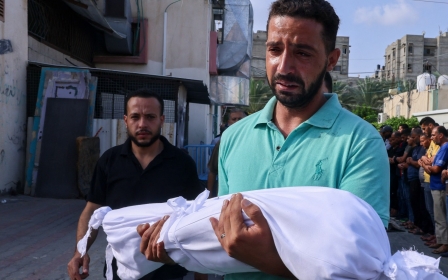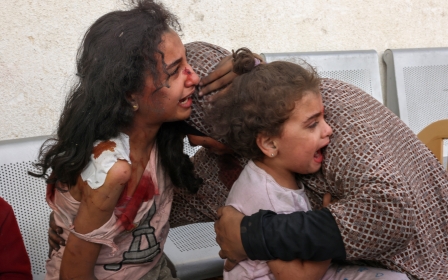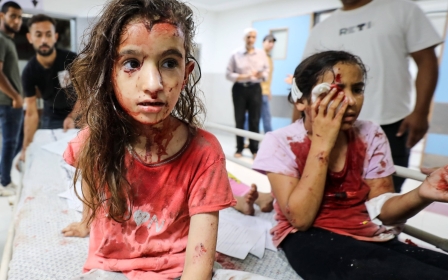Israel-Palestine war: The West can no longer ignore Gaza's humanity

Absent from the Israeli and US discourse today are any moral or humanitarian standards for dealing with the people of the besieged Gaza Strip.
As Israel's Netanyahu government declared members of the Palestinian resistance to be "human animals", many western governments gave Israel a green light to carry out brutal massacres and the war of extermination that is now underway.
The West has turned a blind eye to these humanitarian atrocities, which have included cutting off electricity and water to more than two million people.
This is a blatant affirmation that western governments do not see Palestinians as human beings, nor even as animals; they are viewed as something else, perhaps less, and this distinction extends even to children, women, the elderly and the ill.
The Israeli narrative has spread across the West with extreme ease, successfully demonising Hamas as an extension of the Islamic State. Israeli and US officials have drawn comparisons to 9/11, which have been enthusiastically picked up by the western media machine.
New MEE newsletter: Jerusalem Dispatch
Sign up to get the latest insights and analysis on Israel-Palestine, alongside Turkey Unpacked and other MEE newsletters
But true terrorism, in its most powerful form, has instead been evident in what the occupation army is doing to Palestinians, under cover of western support.
Another major humanitarian disaster is at hand, as the Israeli military strategy aims to create terror in the hearts of Gaza's people through large-scale, indiscriminate bombing. The assault aims to displace the majority of the population and eliminate Hamas's paramilitary wing, the Qassam Brigades.
Two options
The violent bombardment of Gaza has involved the levelling of entire neighbourhoods, with more than 1,800 people killed by Saturday morning and thousands more wounded so far. In Israel, the number of people killed following the Hamas incursion has surpassed 1,300.
Some people in Gaza have been trapped under the rubble, while others have been killed directly in Israeli air strikes. The Israeli army is trying to ensure resistance will be at its lowest when the ground invasion begins.
The residents of Gaza are now left with two options: the first is to remain at the mercy of Israel's killing, bombing and extermination, alongside their families and children, and passively watch death come. This would make the mission of Israeli troops on the ground more difficult, although the world should be under no illusions about the extent of Israeli brutality.
Follow Middle East Eye's live coverage for the latest on the Israel-Palestine war
The second option is for them to take refuge in any other place that will accept them, and try to save their families from this horrific and merciless slaughter.
In contrast to the Israeli perspective that sees the people of Gaza as "human animals", there is another perspective, by which Palestinians are viewed as extraordinary beings with exceptional resilience - people without fear, anxiety or panic over what is descending upon them from the skies. Neither is true.
In reality, there is no refuge or escape; the borders are all closed and Egypt has refused to be a part of Israel's depopulation strategy
And yet, many people view with detachment the unfolding events, observing coldly that the people of Gaza are culpable for what's to come because they are refusing to leave their homes.
Hundreds of thousands of Palestinians have already been displaced in this war as their homes have been razed, and more are fleeing as Israel's ground invasion looms. Others are vowing to stay in their homes, defying an Israeli evacuation order across the north.
In reality, there is no refuge or escape; the borders are all closed and Egypt has refused to be a part of Israel's depopulation strategy.
Regardless, as Israel's barbaric onslaught intensifies, the numbers of those leaving their homes and neighbourhoods could be on track to spike significantly, and the future for the Palestinian population is becoming increasingly unclear.
The views expressed in this article belong to the author and do not necessarily reflect the editorial policy of Middle East Eye.
Middle East Eye delivers independent and unrivalled coverage and analysis of the Middle East, North Africa and beyond. To learn more about republishing this content and the associated fees, please fill out this form. More about MEE can be found here.





